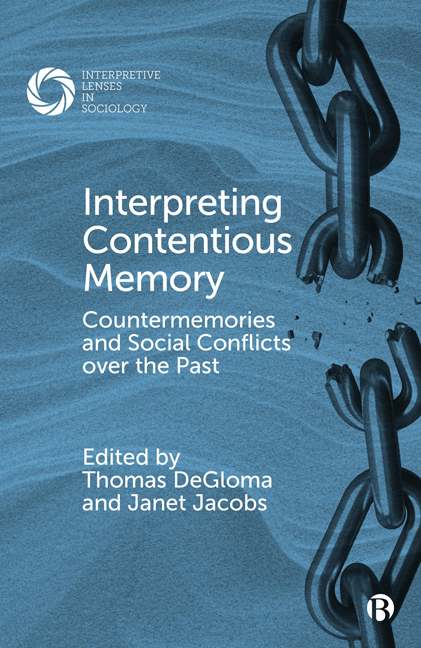Book contents
- Frontmatter
- Contents
- Series Editors’ Preface: Interpretive Lenses in Sociology – On the Multidimensional Foundations of Meaning in Social Life
- Notes on Contributors
- Acknowledgments
- 1 Introduction: Interpreting Contentious Memories and Conflicts over the Past
- PART I Interpreting Memories in the Social Dynamics of Contention
- PART II Racism, Exclusion, and Mnemonic Conflict
- PART III Genocide, Memory, and the Historicizing of Trauma
- Index
3 - Feminist Approaches to Studying Memory and Mass Atrocity
Published online by Cambridge University Press: 20 January 2024
- Frontmatter
- Contents
- Series Editors’ Preface: Interpretive Lenses in Sociology – On the Multidimensional Foundations of Meaning in Social Life
- Notes on Contributors
- Acknowledgments
- 1 Introduction: Interpreting Contentious Memories and Conflicts over the Past
- PART I Interpreting Memories in the Social Dynamics of Contention
- PART II Racism, Exclusion, and Mnemonic Conflict
- PART III Genocide, Memory, and the Historicizing of Trauma
- Index
Summary
In 1994, Andrea Dworkin published the Ms. Magazine article titled, “The unremembered: Searching for women at the Holocaust Memorial Museum.” Dworkin (1994) had gone “to the United States Holocaust Memorial Museum with questions about women,” only to find no answers because women and gender were not discussed in the museum or the respective archives. Since 1994, feminist scholars have examined the gendered dimensions of mass atrocity (Wolf, 1996; Sharlach, 1999; Jones, 2004; Brown, 2017), and the Holocaust in particular (Baumel-Schwartz, 1998; Ofer and Weitzman, 1998; Goldenberg and Shapiro, 2013), including patterns of victimology, misogynistic propaganda, gendered mobilization efforts, and sexual and gender-based violence (SGBV). Gendered dynamics also include the ways that previously established gender norms and division of labor shape victimization and perpetration experiences and their respective aftermath. Despite such discoveries, however, collective memory projects and memory studies have been slow to recognize gender as a central element of both atrocity and memory. Yet, doing so is imperative; understanding the gendered dynamics of commemoration and collective memory in general allows for interrogation of how a past wrought with state-sanctioned violence, extermination, and mass human rights violations is remembered through a gendered lens in particular. Social scientists have long argued that how we remember the past shapes present-day social relations, access to resources, and power/ privilege (Graybill, 2001; Savelsberg and King, 2005; Hagopian, 2009). Thus, it follows that the marginalization of narratives that illuminate the gendered dynamics of commemoration, memorialization, and collective memory perpetuates present-day inequalities.
This chapter begins with an overview of how and why narratives that shape national collective memory of past atrocity neglect gender. This neglect is shocking given the sheer magnitude and ubiquity of SGBV documented in all recorded wars and mass atrocities. Importantly, such silences translate into contemporary inequalities as who a society remembers and values as a victim of a crime shapes who has access to resources such as education, financial support, and social capital. Next, I suggest ways for scholars to remedy this oversight in research on gender and case studies of contentious memory, and how to integrate a feminist lens in various stages of the research and writing process. This includes oversampling strategies, choosing subjects, qualitative data collection strategies, and approaches to analyzing data, including the analytical vitality of listening to the silences and gaps present in qualitative data.
Information
- Type
- Chapter
- Information
- Interpreting Contentious MemoryCountermemories and Social Conflicts over the Past, pp. 49 - 68Publisher: Bristol University PressPrint publication year: 2023
